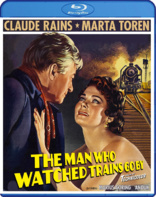The Man Who Watched Trains Go By Blu-ray Movie
HomeThe Man Who Watched Trains Go By Blu-ray Movie 
The Paris ExpressClassicFlix | 1952 | 80 min | Not rated | May 29, 2018
Movie rating
6.6 | / 10 |
Blu-ray rating
| Users | 0.0 | |
| Reviewer | 3.5 | |
| Overall | 3.5 |
Overview
The Man Who Watched Trains Go By (1952)
A Dutch company's owner bankrupts his own company, burns the incriminating ledgers and plans to run to Paris with the company payroll. But he is caught in the act by his accountant who challenges his actions, leading to a reversal of roles.
Starring: Claude Rains, Märta Torén, Marius Goring, Herbert Lom, Anouk AiméeDirector: Harold French
| Film-Noir | Uncertain |
| Crime | Uncertain |
| Drama | Uncertain |
Specifications
Video
Video codec: MPEG-4 AVC
Video resolution: 1080p
Aspect ratio: 1.33:1
Original aspect ratio: 1.37:1
Audio
English: DTS-HD Master Audio 2.0 Mono (48kHz, 24-bit)
Subtitles
English SDH
Discs
Blu-ray Disc
Single disc (1 BD)
Playback
Region A (B, C untested)
Review
Rating summary
| Movie | 3.5 | |
| Video | 4.0 | |
| Audio | 3.5 | |
| Extras | 0.0 | |
| Overall | 3.5 |
The Man Who Watched Trains Go By Blu-ray Movie Review
Reviewed by Jeffrey Kauffman June 5, 2018Georges Joseph Christian Simenon may not be a name with the immediate cachet of, say, Agatha Christie, but, like Christie, Simenon is responsible for some of the most engaging “crime fiction” of his era. Ironically, Simenon was Belgian, the same nationality as one of Christie’s most inimitable creations, the natty, near obsessive compulsive Poirot, but perhaps Simenon’s most well remembered creation was a French detective named Maigret. While “officially” Belgian, Simenon’s family evidently had Dutch origins, and that may be one reason why Simenon’s 1938 novel The Man Who Watched Trains Go By features a Dutch location, though aside from the occasional windmill and canal, the locale of this story of incipient madness isn’t really “site specific”, so to speak. Kees Popinga (Claude Rains) is a clerk (i.e., bookkeeper) at a venerable firm run by Julius de Koster Jr. (Herbert Lom). Popinga seems to be one of the midlevel “shlubs” who has probably never really amounted to much, but who still is a decent enough sort, a trustworthy worker drone who also has a devoted wife and a couple of sweet kids. Popinga also has empathy, as evidenced by an early scene where he attempts to convince de Koster to hire a friend of his, a guy who has been put out of work by the sudden demise via bankruptcy of the company where he has spent most of his life toiling away, probably accomplishing nothing. De Koster won’t hear of it, though, since the man seeking employment was the managing director of the company and “should have known” that the company was in perilous financial straits, even though the problems were evidently caused by another employee. De Koster stresses the virtuousness of his own company and how reputation is everything. The fact that these lines are being read by the imperious Herbert Lom, an actor who can seem almost effortlessly devious even when spouting seeming inanities, perhaps provides a bit of a subliminal clue that all may not be entire well at Popinga’s place of employment, either. When a French detective named Lucas (Marius Goring) shows up to investigate a money laundering scheme that has seen Dutch monies flowing into Paris, for a moment it seems like perhaps there’s been a bit of misdirection and the honorable Popinga may indeed be a mastermind. In fact there has been a bit of misdirection, but not that particular kind, as soon becomes apparent.
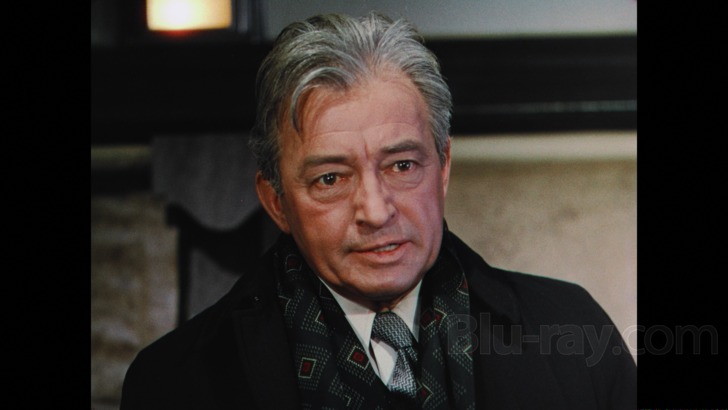
Popinga has already been shown to be a man fascinated by trains. He keeps track (sorry) of the comings and goings of the huge locomotives that roar in and out of town, all on the way to somewhere more desirable than Popinga finds himself. It’s a fitting if somewhat clunky metaphor for a guy who’s stuck with a lot in life that has left him aching for something greater, and it’s a motif that regularly recurs throughout the film. Another probably too “on the nose” use of symbolism comes courtesy of the fact that de Koster, Popinga and Lucas are all chess players, and in one of the early “showdowns” in the film, Lucas handily defeats both de Koster and Popinga. During this first showdown, it also becomes evident that it’s de Koster himself who is the object of Lucas’ investigations. The fact that he’s questioning de Koster about a mysterious woman whom Popinga has just seen de Koster bidding farewell to at the train station, but whom de Koster now claims not to know, seems to finally alert Popinga that something dastardly is brewing. When Lucas rather pointedly asks Popinga if Popinga has his own savings stored with de Koster’s firm, and Popinga answers in the affirmative, a dead weight of sorts seems to suddenly hang around the already sadsack Popinga’s neck.
Already a few convenient coincidences have started to accrue, one potential sticking point for mystery lovers who like things “organized” but not too much, and another one shows up when Popinga happens to spy de Koster attempting to burn records, supposedly as a prelude to de Koster committing suicide. When Popinga discovers that de Koster is in fact really preparing to hightail it to some undisclosed locale, with a briefcase full of money no less, Popinga suddenly transforms into a feral presence, with the upshot being that there’s no de Koster and suddenly Popinga has a suitcase full of money. Another bit of perhaps too convenient felicity intrudes when Popinga discovers the ID of that aforementioned mysterious woman, who turns out to be a Parisian siren named Michele Rozier (Marta Toren), and for reasons which aren’t really overly well motivated, Popinga takes off on a train to track her down. (One of the curious elisions in this narrative is what ends up happening to Popinga’s sweet natured wife and his two kids.) Yet another "coincidence" occurs when the train Popinga takes to Paris has another passenger, namely Lucas. Suffice it to say two kinds of chess games ensue.
While probably too littered with unlikely synchronicities to ever really register as “realistic”, The Man Who Watched Trains Go By has some really interesting plot dynamics going forward, with Popinga becoming infatuated by Michele, and Michele at least pretending to return the favor, especially after Lucas lets her know that Popinga probably has a huge stash of cash hidden away somewhere (why no one thinks to open the briefcase is left unanswered). Interestingly, Lucas isn’t really after Popinga, at least not in the traditional sense (and at least not initially). He is under the (mistaken?) impression that Popinga is not involved with de Koster’s disappearance and purports to simply want to keep the “decent” Popinga from getting in over his head. As the film has already made abundantly clear, though, Popinga is not just over his head, he’s slowly going out of his mind at the same time.
While never really emotionally very visceral (something that I think could have been altered had Popinga’s wife and children continued to play into the proceedings), the film is anchored by a really wonderful performance by Rains. It’s almost forgotten these days how this great actor, one who is perhaps best remembered for his iconic turn in Casablanca , essayed not one but two “wounded monsters” in the Universal canon, The Invisible Man and the 1943 version of Phantom of the Opera (interestingly, Herbert Lom would portray the scarred composer in the 1962 version of the story). Rains brings that same intensity along with a similar instability and even vulnerability to the role, making Popinga something almost akin to a tragic hero.
The Man Who Watched Trains Go By Blu-ray Movie, Video Quality 
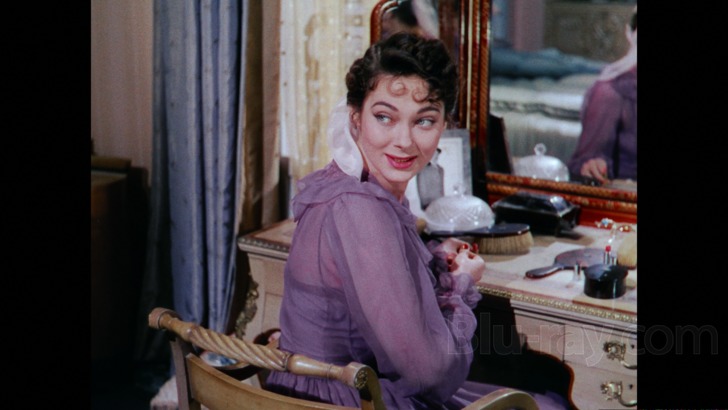
The Man Who Watched Trains Go By is presented on Blu-ray courtesy of ClassicFlix with an AVC encoded 1080p transfer in 1.33:1. If I'm remembering correctly, this is the first color film ClassicFlix has released, and by and large the results are very satisfying for devotees of old school Technicolor. There are definitely variances in color temperature here, with some scenes looking cooler (typically with a blue undertone present) and others looking warmer (typically with reds emphasized), but on the whole things look nicely saturated. I've tried to provide a variety of screenshots showing some of the temperature differences, so I recommend parsing all of them for at least some idea of the variances on display. There is also occasional damage that pops up now and again, as in screenshot 4. (Speaking of screenshot 4, that's Anouk Aimee, who is billed as Aimee Anouk in the opening credits, and then just Anouk in the closing credits). Grain looks natural but can occasionally assume a slightly yellow quality, some of which is due to this film's almost nonstop use of optical dissolves. Clarity and detail levels are generally quite pleasing and even with some of the palette differences, I personally found the color looking nice as well.
The Man Who Watched Trains Go By Blu-ray Movie, Audio Quality 
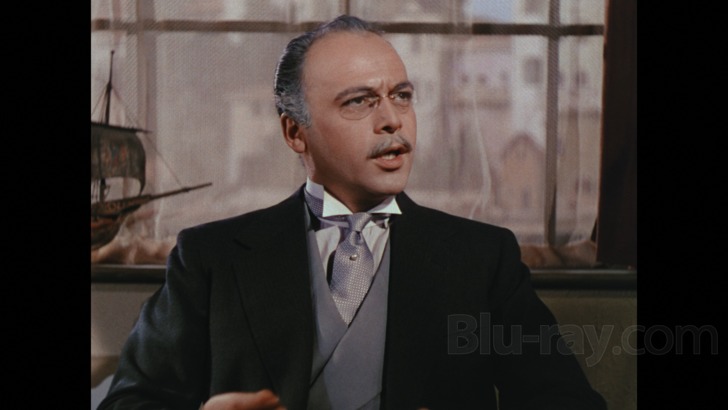
The Man Who Watched the Trains Go By features a DTS-HD Master Audio 2.0 mono mix that can sound just a trifle brash in the higher registers (as in the fanfare accompanying the Eros Films masthead), but which is generally fine in terms of providing support for dialogue and effects (as may be expected, there are a lot of train sounds click-a-clacking through this film). Unless I have a defective disc, there's just a snippet of score missing at the very end. The score by Benjamin Frankel is really quite interesting and I found it extremely effective.
The Man Who Watched Trains Go By Blu-ray Movie, Special Features and Extras 

There are no supplements on this disc.
The Man Who Watched Trains Go By Blu-ray Movie, Overall Score and Recommendation 
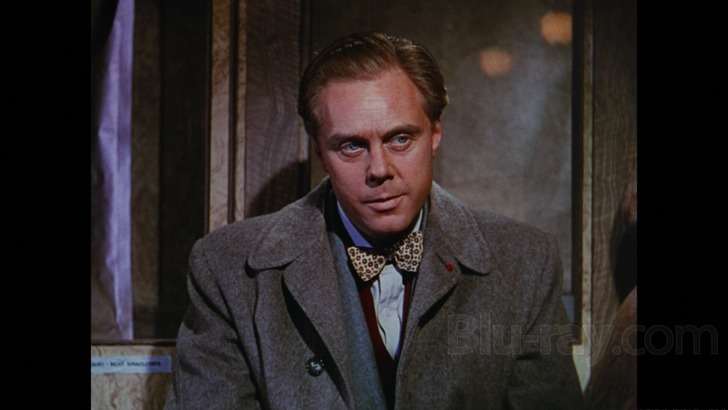
I was genuinely intrigued if not always outright surprised by some of the plot dynamics at play in The Man Who Watched Trains Go By, a lot of which has to do with Rains' nice portrayal of an everyday shmoe suddenly taken over by his raging Id. There are a few too many convenient contrivances for this to really work as a "mystery", but as a character study it's often quite compelling. ClassicFlix has delivered another niche film with very good to excellent technical merits, and The Man Who Watched Trains Go By comes Recommended.
Similar titles
Similar titles you might also like

Abandoned
1949

On Dangerous Ground
Warner Archive Collection
1951

Shield for Murder
1954

The Captive City
1952

Impact
Collector's Edition
1949

I Wake Up Screaming
Hot Spot
1941

Mystery Street
Warner Archive Collection
1950

Naked Alibi
1954

So Dark the Night
1946

The Stranger
1946

Crime of Passion
1957

Jack Irish: Season 2
2018

The Last Seduction
1994

They Made Me a Fugitive
I Became a Criminal / Kino Classics Presents
1947

The Blue Dahlia
1946

Out of the Past
Warner Archive Collection
1947

Storm Fear
1955

Where the Sidewalk Ends
Limited Edition to 3000 - SOLD OUT
1950

The Price of Fear
1956

You Only Live Once
1937
